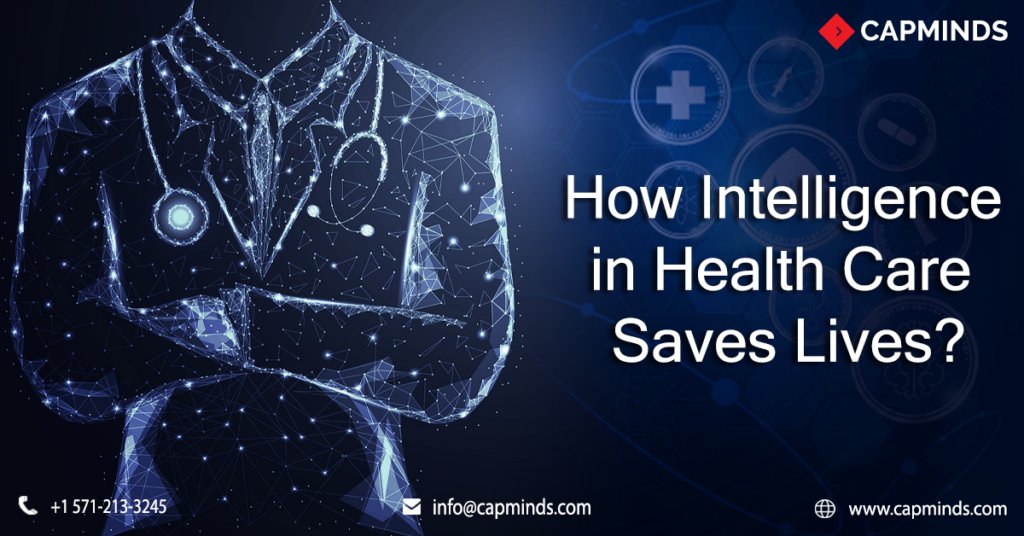How to Intelligence in HealthCare Saves Lives?
Whether it’s diagnosing breast cancer or analyzing scans, artificial intelligence is changing the way the world of healthcare operates. Modern healthcare has machines and the right dose of intelligence to learn and take necessary actions that can save the lives of people. AI is helping all the key stakeholders in the world of healthcare by offering various kinds of solutions that would have been unimaginable just a decade ago.
Here are 10 ways in which intelligence is changing healthcare:
1. Dosage accuracy:
We all know how changes in dosage while administering medicines can even be fatal in many cases. Research says that of all the medical errors that are possible, more than 37% of them come from dosage errors. Using AI to verify the correct dosage led to a 51 percent reduction in errors including savings of more than $2.2 million in a large hospital.
2. Detection of anomalies:
It is the process of identifying something that is not normal and doesn’t conform to a pattern. AI does it by image analysis which checks for any aberrations than the normal on the human body. It helps radiologists take a closer look and improves their efficiency. Instead of having to start their work from scratch, it gives radiologists time to focus on reviewing anomalies which saves time and they can give better care for the patient. It is also used to monitor any data breaches.
3. Builds a strong support system:
There are a lot of people who suffer from mental issues and it can easily transmute into diseases as well. AI has recently been even adept at identifying signs of mental health symptoms. It takes into factors such as the person’s tone, word choice, and how they communicate. In fact, there is an AI-based emotional intelligent penguin called Wysa which listens to, chats and helps people build mental strength. Within its first 3 months, it had more than a million chats with 50,000 users. The users of this site had a myriad of mental health problems that ranged from depression, PTSD, suicidal tendencies, etc.
4. Efficient communication with patients:
AI assistants are used these days to have human-like interactions which will help save a lot of time for the frontline healthcare workers. It can cut down on tonnes of documentation that most of these workers do which will take hours to collect. This is a repetitive and mundane work which can even lead to errors while collecting data. But with the help of AI, there won’t be any issues. If you are an individual who uses specialized medical phrases, the accuracy of the communication will be high.
5. Healthcare insurance:
Another area where technology immensely helps in healthcare is by directing patients to reach insurance providers in the most effective manner. A lot of patients who are in extreme poverty, do not get themselves treated, even if it means death. This can be avoided if they have access to the right insurance service provider.
6. Eliminates backoffice inefficiencies:
A hospital is not only composed of the frontline healthcare workers, but there are a lot of people who put in immense work. If they don’t do their job properly, there will be a lot of inefficiencies that will crop up which can affect the smooth functioning of a hospital. Writing chart notes, ordering tests, setting up rooms, prescriptions, etc, are all important tasks that cannot be taken lightly. With AI, most of these tasks can be automated which means that they can be trained to do something better.
7. Identifying diseased cells:
Did you know that there are computers which can identify cancer cells? Surgeons need biopsies to identify if there are any cancerous cells in the body of the patient. Only then would they know what tissue to remove. That’s why identification of biopsies becomes extremely crucial. These machines were fed images of thousands of cancerous cells and they keep improving their accuracy with each image they check.
8. Training:
AI can be used to train medical professionals as well as frontline workers. These machines can simulate different kinds of scenarios that can be used to help trainees. When they are put in front of a variety of challenging positions, they will build confidence and will learn to make proper decisions without buckling under pressure.
9. Helps avoid illnesses:
With the application of AI and Internet of Medical Things (IoMT), there have been a lot of new applications revolving around consumer health. It encourages good behaviour by encouraging people to walk more steps, drink more water, sleep for more hours, counting calories, reducing sugar intake, etc. These apps also collect data which will be useful to understand the behavior of patients thus making the treatment much easier.
10. Better delivery of healthcare services:
Most of the hospitals these days use the Hospital Information System (HIS) which handles appointments, follow-ups, treatment updates, and so on. By integrating with EHRs of patients, you can offer more health care services for patients. Google’s DeepMind health team is working with hospitals to monitor a patient’s condition through mobile applications. It finds out if the health of the patient deteriorates thus providing them with an opportunity to give treatment as soon as possible. AI in healthcare offers predictive analytics in real-time thus smoothening out any operational inefficiency that may crop up.
Conclusion:
Technology has improved so much that you don’t even have to prick the finger to check blood sugar for a patient. You can even get video appointments with your doctors for a consultation, people with a high risk of heart attack carry around pocket EKGs on their mobile devices these days. Even doctors are using apps that will help them before, during and after complicated surgeries.
There is so much more that is possible and we should be excited at the prospect of newer methods and life-saving “apps” that will become a part of the mainstream medical world soon.

